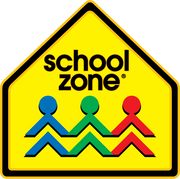Flash cards are an excellent tool for practice testing, offering a delightful and effective method for children from preschool through 6th grade to develop and enhance skills. These simple yet powerful tools make learning engaging and enjoyable. By incorporating flash cards from School Zone into a child's educational routine, parents and educators can help kids improve their memory and understanding across various subjects.
Why flash cards are effective
Flash cards work so well because they use a technique called active recall. This method involves actively engaging with information, which significantly boosts learning. Research shows that active recall, which is what happens with flash card use, helps children strengthen their knowledge and remember things better over time. The University of Arizona Thrive Center cites research from Roediger and Karpicke showing that “Active recall activates the ‘testing effect’ whereby your brain is more likely to move information from your short term memory to your long term memory.”
Flash cards encourage kids to actively interact with the material, helping them retain information rather than just reviewing notes or textbooks. This approach not only aids memorization but also enhances understanding, making it a valuable tool for learning.
How flash cards help the brain
Flash cards are more than just study aids; they align with how our brains process information, making them highly effective. From a cognitive perspective, memory involves encoding, storage, and retrieval. Flash cards support these processes by encouraging active recall, which helps learners retain information more effectively. For a clinical overview of this process see Cognitive Neuroscience Perspective on Memory from Frontiers in Human Neuroscience.
Effective learning techniques with flash cards
Flash cards can be paired with various learning techniques to enhance their effectiveness. Here are some methods to try:
- Spaced Repetition: Review flash cards at increasing intervals to help retain information over time.
- Interleaved Practice: Mix different topics within a study session to boost problem-solving skills. The University of Iowa explains this practice and its benefits.
- Self-Testing: Regularly test with flash cards to identify areas needing more practice.
- Visual Aids: Add images or diagrams to flash cards to make learning more engaging and help visual learners.
For more tips on creating effective study aids, visit Studying 101: Study Smarter Not Harder from The Learning Center at University of North Carolina, Chapel Hill.
Using flash cards effectively
Flash cards are versatile and can make learning both effective and fun. Here are some tips for parents and educators:
- Start Simple: Begin with a small set of cards to keep it manageable. Add more as confidence grows.
- Mix It Up: Shuffle the cards regularly to ensure the child remembers information, not just the order.
- Be Consistent: Incorporate flash card sessions into your daily routine. Short, regular sessions are more effective than long ones.
- Involve Your Child: Encourage your child to create their own flash cards. This process aids learning as they write.
- Interactive Sessions: Turn sessions into a game. Time how quickly your child can go through the deck correctly for a fun challenge.
Using a variety of learning techniques and strategies helps keep lessons lively and kids engaged.
Enhancing learning with digital tools
Incorporating digital tools with traditional flash card learning can greatly enhance learning outcomes. Here’s how:
- Interactive Apps: Digital learning apps offer interactive features that are a familiar go-to for today’s kids.
- Anywhere Teacher: The Anywhere Teacher subscription provides a comprehensive online learning platform for children aged 2 through 8. It includes a wide variety of digital flash cards.
- Gamified Learning: Digital tools with game-like elements keep children motivated and engaged.
- Progress Tracking: Digital tools allow parents and educators to track a child's progress over time.
- Accessibility: Learning can happen anywhere and anytime with digital tools, fitting into busy schedules.
By integrating these digital resources with print flash card learning, parents and educators can create a well-rounded educational experience.
Encouraging learning through play
Flash cards aren't just for memorization; they can make learning fun. Here are some playful ideas:
- Counting Games: Use number flash cards to create a counting game with toys or snacks. See School Zone’s Numbers 0-25 Flash Cards.
- Sorting Activities: Use flash cards with different shapes, colors, or categories for sorting games. School Zone’s Colors, Shapes & More Flash Cards are one example.
- Addition and Subtraction Fun: Use flash cards to practice math skills. Try Addition 0-12 Flash Cards and Subtraction 0-12 Flash Cards or Math War Addition & Subtraction Game Cards for a different spin.
- Memory Match: Play a classic memory game with pairs of flash cards to improve memory and concentration. Memory Match Farm Card Game is a great start!
Practice testing with flash cards is an excellent way to support a child's learning journey. By combining active recall with engaging techniques, flash cards can significantly enhance learning skills. From playful activities to structured study sessions, they offer a flexible and effective way to learn.
Explore the wide range of School Zone products, including flash cards, workbooks, and digital learning apps, to further support your child's growth. In addition, the Anywhere Teacher subscription available on SchoolZone.com offers a comprehensive digital learning experience, integrating technology into daily learning.
Making learning fun, using a variety of creative tools and resources, encourages a love for learning that can last a lifetime!











